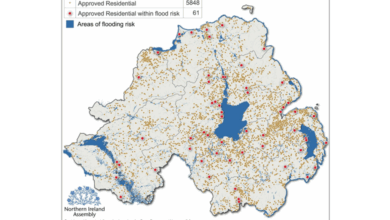Priorities for 2011-2015
 Three years after ISNI2 was published, agendaNi examines the key infrastructure projects likely to be taken forward by the current Executive.
Three years after ISNI2 was published, agendaNi examines the key infrastructure projects likely to be taken forward by the current Executive.
An updated Infrastructure Strategy for Northern Ireland (ISNI3) has been drafted and approved by ministerial special advisers. However, until the Programme for Government is released it is unclear which infrastructure projects will get the green light.
ISNI2 was released in 2008 and outlined infrastructure spending from 2008 to 2018. ISNI3 is required because of the economic downturn and budget cuts and will cover infrastructure spending over the 2011 to 2015 budget period.
The departmental spending plans are a good indication of where funds will be directed.
Following the UK Government’s spending review the draft Budget allocated £5.21 billion to capital spending. This was increased by £167.4 million to £5.38 billion in the final version. This is less than half of ISNI2’s indicative spend of £13.4 billion for 2011 to 2018.
Each department began with a zero baseline and was given sufficient funding to cover their existing contractual commitments. Future allocations will be determined on an individual project basis.
Public and private sector organisations have called for the Executive to quickly publish a Programme for Government and ISNI3.
Education
Already, the impact of the austere Budget is showing. Education Minister John O’Dowd has stated that plans for new school builds “which may prove not to be viable or possible” will no longer be processed by his department. In addition, all new build projects in planning have been suspended at their current stage until a financial assessment is made. However, the ambitious £100 million Lisanelly shared educational campus is to go ahead, according to O’Dowd.
Health
Five of the 10 key milestones identified in ISNI2 were completed on schedule: the Downpatrick enhanced hospital; Castlereagh, Grove and Portadown health and care centres; and the Ulster Hospital redevelopment phase. The Enniskillen- based South West Acute Hospital is under construction, while the Andersonstown and Shankill health centres are due to open this year.
Delays have been experienced on the Gransha mental health crisis centre, which was due to be completed last year, and the Omagh enhanced hospital.
The Omagh enhanced hospital and the Altnagelvin radiotherapy unit are further priorities.
Transport
Regional Development Minister Danny Kennedy has said that £800 million of the £1.2 billion allocated for capital spend from 2011-2015 is allocated to the A5 and the A8. Therefore, “a range of competing priorities would have to be considered for the £60 million of additional funding received for major road projects in year four [2014-2015] of the Budget period.”
Decisions on which schemes will begin in 2014-2015 will be dependent on the funding made available beyond the current Budget period and “that will not become clear until further work has been completed to develop the third edition of the Investment Strategy for Northern Ireland, which is due to conclude this year.”
A spokeswoman from the Department for Regional Development said that £20 million will be made available to ensure that the £75 million Derry to Coleraine line can begin construction in 2014.
Justice
The Department for Justice’s capital allocation over 2011-2015 is £276.6 million. This will include £30 million for the new training college and £27 million for prison refurbishment, to be provided by the Executive.
Forensic Science Northern Ireland is currently housed at Carrickfergus police station since its Belfast premises were destroyed by a Provisional IRA bomb in 1992. It will be provided with a new facility.
Culture and sport
Three regional sport stadia (Casement Park, Ravenhill Stadium and Windsor Park) will receive £110 million for refurbishment. Four new mobile libraries will be provided. Local political pressure makes it hard to close branch libraries.
The Ilex Regeneration project will experience “a landmark year” in 2012- 2013, according to the Budget. It will receive £37.6 million from OFMDFM and DSD for capital works.
| Infrastructure priorities 2011-2015 | Projected cost (£m) | Completion aim |
| DCAL | ||
| Regional sports stadia | 110 | 2015 |
| DE | ||
| Lisanelly Shared Education Campus | 100 | 2015 onwards |
| DEL | ||
| Belfast Metropolitan College, Titanic Campus | 44 | 2011 |
| Belfast Metropolitan College, e3/Workforce Economic Development Project | 14 | 2012 |
| Teaching and research in QUB, UU, St Mary’s and Stranmillis | 58.3 | 2015 |
| DETI | ||
| Invest NI’s co-investment fund and development funds | 46 | 2015 |
| DHSSPS | ||
| Altnagelvin Radiotherapy Unit | 56 | 2016 |
| Antrim Area A&E 24-bed unit | 13.3 | 2011 |
| Craigavon hospital theatre replacement | 11 | 2015 |
| Gransha Mental Health Crisis Centre | 10.7 | 2010 |
| Musgrave Park Neurology Unit | 4.9 | 2011 |
| Old See House (Community Mental Health), Belfast | 11 | 2012 |
| Omagh Enhanced Hospital (phase one) | 75 | 2016 |
| Royal Victoria Hospital critical care unit, including a new maternity unit | 199 | 2012 |
| Sexual Assault Referral Centre, Antrim Area Hospital | 2 | 2012 |
| South West Acute Hospital, Enniskillen | 260 | 2012 |
| DoE | ||
| Northern Ireland Driver Licensing System | 4.2 | 2013 |
| Rethink Waste Fund | 8.8 | 2015 |
| Roe Valley Hydro Electric Scheme | 1.2 | 2015 |
| Strategic Waste Infrastructure Fund | 2.8 | 2015 |
| Thompson Dock Gate Project | 1.5 | 2012 |
| DoJ | ||
| Desertcreat Integrated Training College | 138 | 2015 |
| Laboratory Services Accommodation Project | 12 | 2015 |
| Prison estate redevelopment | 54 | 2015 |
| DRD | ||
| A5 Western Transport Corridor* | 650-850 | 2015 |
| A8 Larne to Belfast | 110-120 | 2015 |
| A32 Cherrymount Link, Enniskillen | 12-16 | 2013 |
| A32 Shannaragh | 6-8 | to start in 2012 |
| Derry to Coleraine rail line | 75 | to start in 2014 |
| Water treatment upgrade | 667.9 | 2015 |
| DSD | ||
| Ilex regeneration plan | 14.6 | 2015 |
| OFMDFM | ||
| Ilex regeneration plan | 23 | 2015 |
Sourced from departments
* £400 million to come from the Irish Government





